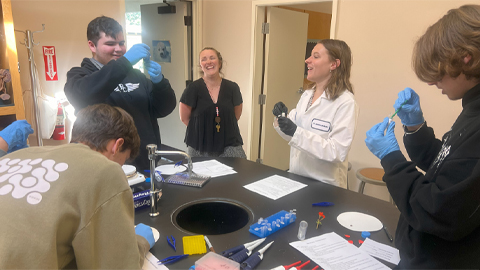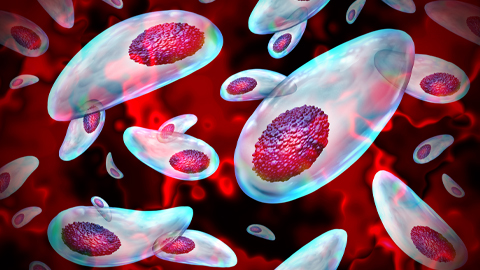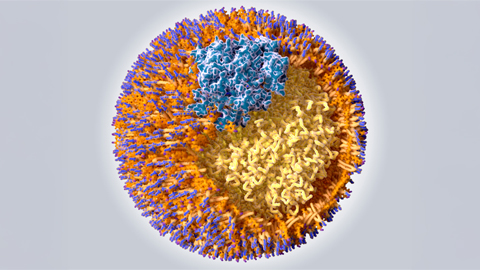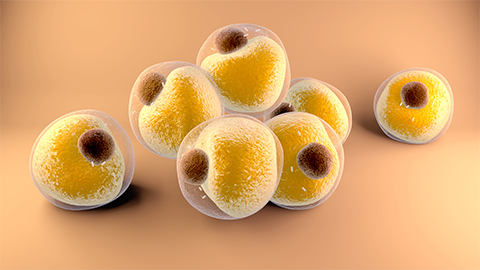New clues on how lipid emulsions prevent liver disease in preterm babies
Infants born prematurely may require parenteral or intravenous nutrition to provide the necessary nourishment, as their digestive system is immature and cannot digest nutrients. However, prolonged parenteral nutrition is associated with complications, including cholestasis, or lack of bile flow from the liver into the small intestine, which leads to accumulation of bile acids and injury in the liver. Emerging clinical studies have shown that cholestasis can be prevented in preterm infants with parenteral administration of oil emulsions ‒ mixtures made of multiple oil components ‒ but the mechanism mediating this effect remains unclear.

Working with preterm piglets, an international group led by researchers at the USDA-ARS Children’s Nutrition Research Center (CNRC) at Baylor College of Medicine and Texas Children’s Hospital found evidence that the protective effect of parenteral oil infusions is accompanied by changes in the levels of gut bile acids (gut bile acid pools) and in the gut microbiome, making this study the first to connect parenteral oil infusions, the microbiome, metabolism and health. The study appears in the Journal of Lipid Research.
Studying parenteral oil emulsions

“The piglet model enables us to study parenteral nutrition-associated liver diseases, such as cholestasis, in a way that is clinically relevant,” said senior author Dr. Douglas Burrin, research physiologist at the CNRC and professor of pediatrics at Baylor. “We treat preterm piglets similarly to how we treat preterm infants in the hospital and look at liver function and gene expression in the piglets to better understand the physiology.”
The original lipid emulsion developed for parenteral nutrition in infants was based on one component, soybean oil, and it has been the only parenteral lipid option used for preterm infants for about 45 years. Although this oil emulsion has helped support infants’ growth, physicians have been concerned that it could be involved in the development of several conditions, including liver disease. This prompted the development of new lipid emulsions with multiple oil components to prevent or treat parenteral nutrition-associated liver diseases.
They published their first findings in 2014. The Baylor researchers and others have shown that pure fish oil and multicomponent oil lipid formulations can reduce cholestasis associated with long-term parenteral nutrition, but how this happens still is not completely understood.
In the current study, the researchers expanded their original investigations by comparing two previously studied oil emulsions ‒ soybean oil only (Intralipid) and a combination of soy, olive, coconut and fish oils (SMOFlipid) ‒ and a new experimental formulation (EXP), that was similar to SMOFlipid, but with additional DHA, an omega-3 fatty acid, and arachidonic acid.
An additional experimental group (ENT) used for reference consisted of piglets fed infant formula through a feeding tube. The experiment lasted 22 days.
New insights into how parenteral oil emulsions work
The researchers evaluated the effects of the different oil emulsions in preterm piglets by measuring cholestasis, gut bile acids pools and the composition of microbial communities in the colon as well as the profiles of the microbes’ metabolic products or metabolites.

The findings confirmed that multicomponent oil emulsions (SMOF and EXP), but not Intralipid, can prevent cholestasis and restore bile flow in preterm piglets as observed in the ENT group.
“One of the important findings showed that prevention of cholestasis was accompanied by maintaining normal gut bile acid pools. They were lowest in the piglets treated with Intralipid but increased in the SMOF and EXP groups and were comparable to ENT,” Burrin said.
A particularly interesting new finding was that cholestasis was associated with changes in the gut microbiome and their metabolite profile.

“It’s exciting to see such a direct connection between gut bacteria and the lipid composition of parenteral nutrition,” said first author Dr. Lee Call, a former Translational Biology and Molecular Medicine graduate student in the Burrin lab during the development of this work. Call currently is a postdoctoral fellow at Department of Energy Joint Genome Institute at Lawrence Berkeley National Lab.
“We have been certain that the lipid emulsions contribute an important effect on growth and metabolism, but the mechanism and the direct causal effect was lacking. This work provides those missing links that offer newer insights that will go a long way in the development of better, safer lipid emulsions for use in preterm infants. It is exciting to be a part of this discovery,” said co-author Dr. Muralidhar Premkumar, assistant professor of pediatrics-newborn at Baylor and Texas Children’s.
Enjoy reading ASBMB Today?
Become a member to receive the print edition four times a year and the digital edition monthly.
Learn moreGet the latest from ASBMB Today
Enter your email address, and we’ll send you a weekly email with recent articles, interviews and more.
Latest in Science
Science highlights or most popular articles

E-cigarettes drive irreversible lung damage via free radicals
E-cigarettes are often thought to be safer because they lack many of the carcinogens found in tobacco cigarettes. However, scientists recently found that exposure to e-cigarette vapor can cause severe, irreversible lung damage.

Using DNA barcodes to capture local biodiversity
Undergraduate at the University of California, Santa Barbara, leads citizen science initiative to engage the public in DNA barcoding to catalog local biodiversity, fostering community involvement in science.

Targeting Toxoplasma parasites and their protein accomplices
Researchers identify that a Toxoplasma gondii enzyme drives parasite's survival. Read more about this recent study from the Journal of Lipid Research.

Scavenger protein receptor aids the transport of lipoproteins
Scientists elucidated how two major splice variants of scavenger receptors affect cellular localization in endothelial cells. Read more about this recent study from the Journal of Lipid Research.

Fat cells are a culprit in osteoporosis
Scientists reveal that lipid transfer from bone marrow adipocytes to osteoblasts impairs bone formation by downregulating osteogenic proteins and inducing ferroptosis. Read more about this recent study from the Journal of Lipid Research.

Unraveling oncogenesis: What makes cancer tick?
Learn about the ASBMB 2025 symposium on oncogenic hubs: chromatin regulatory and transcriptional complexes in cancer.

